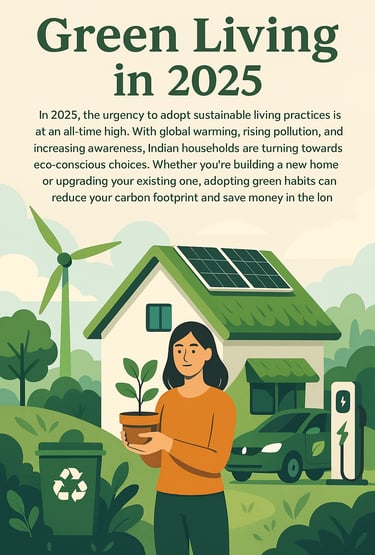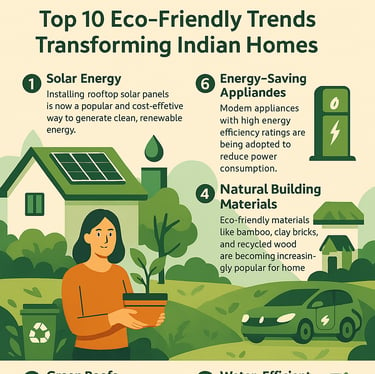"Green Living in 2025: Top 10 Eco-Friendly Trends Transforming Indian Homes"
Green Living in 2025 , the urgency to adopt sustainable living practices is at an all-time high. With global warming, rising pollution, and increasing awareness, Indian households are turning toward eco-conscious choices. Whether you're building a new home or upgrading your existing one, adopting green habits can reduce your carbon footprint and save money in the long run.
flixah developers
8/2/20253 min read


"Green Living in 2025: Top 10 Eco-Friendly Trends Transforming Indian Homes"
Green Living in 2025 , the urgency to adopt sustainable living practices is at an all-time high. With global warming, rising pollution, and increasing awareness, Indian households are turning toward eco-conscious choices. Whether you're building a new home or upgrading your existing one, adopting green habits can reduce your carbon footprint and save money in the long run.
Let’s explore the top 10 eco-friendly trends that are transforming Indian homes in 2025.
1. Solar Power Is Going Mainstream
Thanks to government subsidies and falling solar panel costs, solar power has become more accessible than ever. Households are now installing rooftop solar systems to reduce electricity bills and contribute to cleaner energy use.
From apartment complexes to independent villas, solar adoption is expected to grow by 20% year-over-year in India.
Quick Tip: Opt for hybrid solar systems that allow grid and battery storage. It’s perfect for handling power cuts in areas with unstable supply.
2. Smart Water Management
Water scarcity is a growing issue in many Indian cities. In 2025, smart water management tools like automatic leak detectors, smart irrigation systems, and rainwater harvesting are gaining popularity.
Builders now integrate greywater recycling systems in new homes, allowing water from washing machines and sinks to be reused for flushing and gardening.
Trending Product: IoT-based water meters with mobile app tracking are a hit among environmentally conscious homeowners.
3. Eco-Friendly Construction Materials
Traditional materials like cement and bricks are being replaced by fly ash bricks, bamboo, recycled wood, and hempcrete. These materials are not only sustainable but also cost-effective and durable.
Architects and interior designers are now suggesting VOC-free paints, natural stone flooring, and upcycled furniture to meet the growing demand for healthier homes.
4. Organic Rooftop Gardens and Vertical Farming
The farm-to-fork movement is now reaching rooftops. Urban families in 2025 are growing their own organic vegetables and herbs using vertical farming units, hydroponics, and compact balcony gardens.
Rooftop gardening is not just a trend—it improves air quality, reduces heat in urban buildings, and promotes a healthy lifestyle.
Expert Insight: Use drip irrigation and compost bins to turn kitchen waste into natural fertilizer.
5. Energy-Efficient Appliances Are the Norm
Indian consumers are shifting from regular appliances to BEE 5-star rated devices, inverter ACs, and smart refrigerators that consume less power.
Even traditional products like ceiling fans and water heaters now come in energy-efficient variants, helping cut power bills by up to 30%.
What’s Hot in 2025: Home automation systems that monitor your appliance usage and suggest energy-saving tips in real time.
6. Minimalist and Sustainable Interiors
The new-age Indian home is no longer cluttered. Instead, minimalist, nature-inspired interiors are dominating 2025 trends. Homeowners are ditching plastic décor for handcrafted wooden items, terracotta planters, and jute rugs.
Also in demand: multi-purpose furniture made from reclaimed wood and sustainable textiles like organic cotton and bamboo fabrics.
7. Zero-Waste Kitchens
From metal straws to reusable beeswax wraps and glass storage jars, zero-waste kitchens are the new norm.
In 2025, Indian households are ditching disposable plastic and embracing tools like compost bins, biodegradable dish soaps, and refillable spice jars.
Smart Addition: Install a food waste disposer in your sink to turn scraps into compost-friendly material.
8. Green Certifications and Eco-Rated Homes
Buyers in 2025 are increasingly looking for IGBC (Indian Green Building Council) and Griha-certified homes. These ratings ensure that your building follows green practices, from construction to energy and water use.
Real estate developers are now offering green-certified apartments as a USP to attract environmentally conscious buyers.
9. Electric Vehicle (EV) Charging at Home
With the rise of electric cars and two-wheelers in India, home EV charging stations are a trending addition.
Societies and gated communities are mandating EV charging points in their parking lots to future-proof their infrastructure.
Government schemes are also offering tax rebates and subsidies for residential EV charging installation.
10. Conscious Consumption Habits
The green home of 2025 goes beyond gadgets and materials—it’s about mindset. Indian families are now:
Buying locally produced items
Supporting eco-conscious brands
Avoiding single-use plastics
Teaching kids about sustainability at an early age
Platforms like RePurpose Global, Bare Necessities, and Brown Living are helping Indian consumers discover sustainable alternatives.
Conclusion
Green living in 2025 is not just a trend—it’s a necessity. With rising environmental challenges, Indian households are at the forefront of adopting sustainable lifestyles. From solar panels and rainwater harvesting to zero-waste kitchens and green certifications, there are countless ways to make your home future-ready.
Whether you're a homeowner, renter, or real estate developer, embracing these trends is a step toward a healthier, more sustainable future.
for more info on real estate investment please visit our website flixahdeveloperspvtltd.com and you can also callus @ +91 9100600730


